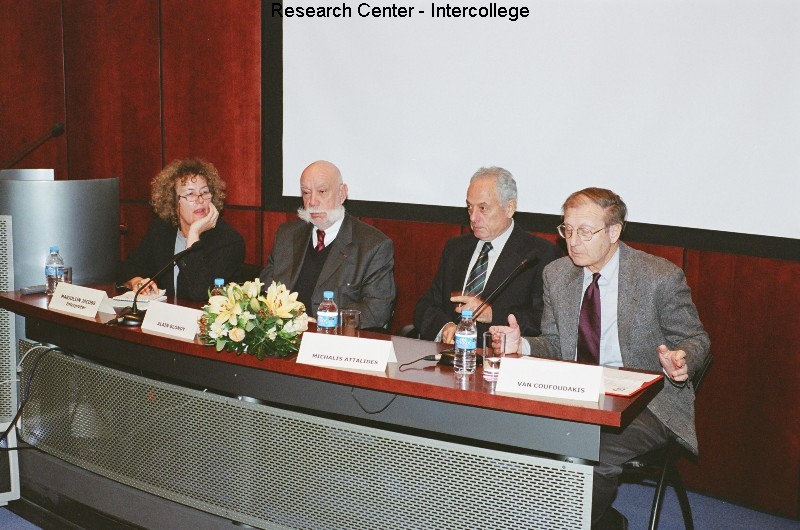EUROPE, TURKEY AND CYPRUS: PAST, PRESENT AND FUTURE
Round-Table Discussion organized by
the French Embassy in Cyprus and the Research Center – Intercollege on February 1, 2006
Addressing a large audience at Intercollege, Alain Blondy, Professor of Modern History at the University of Sorbonne-Paris-IV, examined the circumstances which led to the creation of the European Union as well as the current major challenges. Special emphasis was given to the relations with Turkey and the role of the US.
Blondy analyzed the moral and philosophical principles on which the EU was founded and explained its strengths and weaknesses. Reference was made to the US and Russia with emphasis on the different strategic challenges such as the situation in the Middle East before and after the end of the Cold War. Within this context he also addressed the geopolitics of different powers – the USA, the UK, Russia – and the implications for the development and future of the Union. He also noted that it was important to understand the historical background, including the battle between democracy and dictatorship that led to the establishment and strengthening of the bonds among the European states.
Turkey, said Professor Blondy, appears to pose serious challenges for the EU in terms of defining its own boundaries both geographically and economically, but also in terms of defining its own values, social framework and strategic options. He stressed that although Turkey has elements which are European, at the same time it cannot be considered a European country. Geographically, Turkey is predominantly an Asian country. Moreover, within Turkey there are different perceptions on fundamental issues. Although there is a section of Turkey’s population which ascribes to European values, this is not the rule. He also stressed that the major pillars on which the Turkish culture and value system are based, are not European.
In relation to this, he also touched on France’s rather reserved position towards Turkey’s accession. Blondy expressed the view that it is perhaps better if Turkey and the EU have a special relationship. Such a relationship would help Turkey achieve its modernization goals and a better standard of living, while the EU would not be compromised.
In relation to Cyprus, he expressed the view that the EU sees this island-state as a single political entity – the Republic of Cyprus. But the EU cannot interfere in its domestic affairs. The US has much more leverage on Turkey than the EU, he added. Blondy also noted that if Washington demanded the withdrawal of Turkish troops from Cyprus, Ankara would act accordingly.
The round table was chaired by the Dean of the School of Humanities, Social Sciences and Law - Intercollege, Professor of Sociology Michalis Attalides, while the Rector of Intercollege, Professor of Political Sciences Van Coufoudakis gave a welcoming address.
